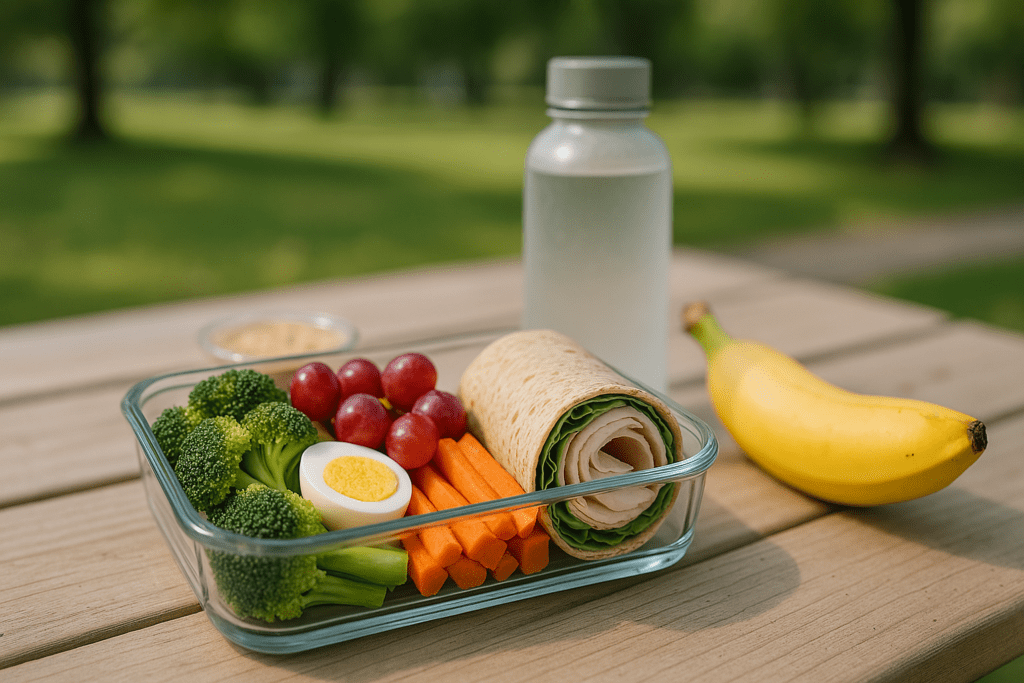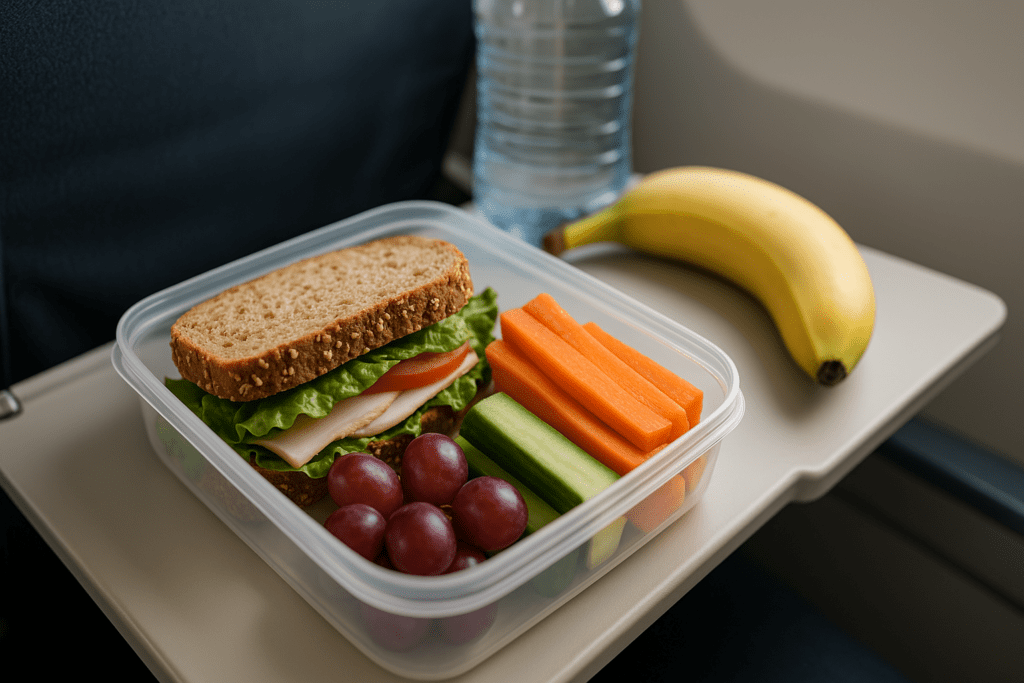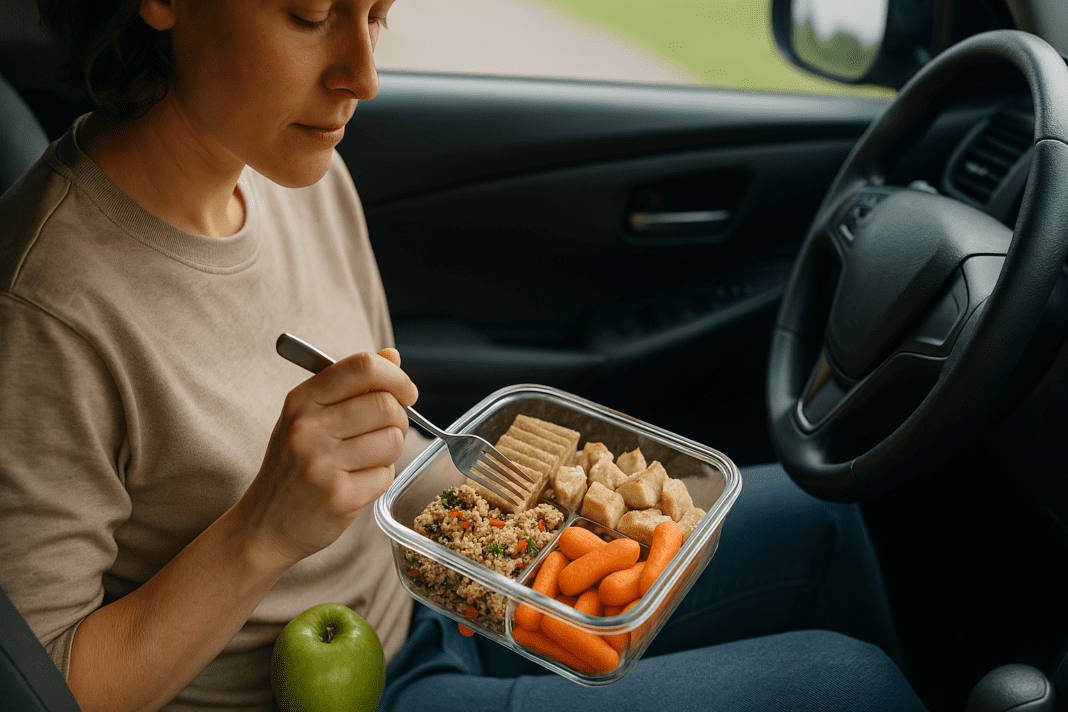Taking a road trip is one of life’s great pleasures—an opportunity to explore new places, experience freedom from routine, and make lasting memories. Yet, amidst the joy of travel, maintaining a healthy diet can be a real challenge. Fast food drive-thrus, gas station snacks, and limited access to fresh meals often lead travelers to compromise on nutrition. For those who value mindful eating and a healthier lifestyle, it’s essential to plan ahead. In this guide, we explore how to prepare and choose healthy road trip meals and share travel lunch ideas that are both nourishing and convenient, helping you feel energized and well throughout your journey.
You may also like: Smart Healthy Eating Tips for Busy Professionals: How to Stay Nourished When You’re Always on the Go
Understanding the Importance of Nutrition While Traveling
Traveling, particularly by car, often disrupts regular routines, and this disruption includes eating habits. Long hours behind the wheel, irregular meal times, and limited food options contribute to poor nutritional choices. Consuming high-sugar, high-fat convenience foods may provide temporary satisfaction, but they often lead to energy crashes, sluggishness, and digestive discomfort. On the other hand, making a conscious effort to choose healthy road trip meals can improve mood, focus, and overall physical well-being.
Scientific evidence highlights the connection between diet and cognitive performance. Balanced meals rich in fiber, lean protein, healthy fats, and complex carbohydrates help regulate blood sugar levels and sustain energy over time. For drivers and passengers alike, staying alert and focused is crucial for safety. Additionally, eating nutrient-dense foods can help support the immune system, which may be especially important when traveling through different regions or interacting with new environments. Prioritizing nutrition during travel isn’t just about avoiding junk food; it’s a form of self-care that enhances the overall travel experience.
Strategic Meal Planning Before Your Journey
Preparing meals in advance is one of the most effective ways to ensure healthy eating on the road. A well-thought-out plan saves time, money, and stress while helping travelers avoid impulse purchases that often veer into unhealthy territory. Start by mapping out your route and identifying locations where you may stop for meals. Then, create a list of dishes and snacks that can be prepped at home and stored safely for several hours or days.
When planning healthy road trip meals, consider recipes that are shelf-stable or require minimal refrigeration. Dishes like quinoa salads, grain bowls, hummus wraps, and pasta salads with olive oil-based dressings are flavorful, satisfying, and travel well in coolers. Pair these with fresh fruits, chopped vegetables, and whole-grain crackers for a complete meal. For added convenience, store meals in reusable containers with tight lids, and pack a cooler with ice packs to maintain food safety. Making meals in batches allows for variety without requiring daily preparation.

Nutrient-Dense Ingredients That Travel Well
Choosing ingredients that are both nutritious and durable is essential when crafting meals for travel. While fresh produce is always ideal, some fruits and vegetables fare better on the road than others. Apples, oranges, carrots, snap peas, and cherry tomatoes are all excellent options because they resist bruising and do not require immediate refrigeration. Nuts and seeds provide healthy fats and protein, and they’re easy to portion into snack-size servings.
Hard cheeses such as cheddar or gouda, nut butters, canned beans, and whole grains like couscous or farro also make reliable additions to road trip meals. These foods offer long-lasting satiety, which helps reduce the urge to snack constantly. When assembling travel lunch ideas, think about how each ingredient contributes to both flavor and nourishment. Combining textures and tastes—such as creamy avocado with crunchy cucumbers or spicy roasted chickpeas with sweet bell peppers—keeps meals interesting and enjoyable even after several hours on the road.
Healthy Breakfast Options for Road Trips
Breakfast often sets the tone for the day, and that remains true even when traveling. Unfortunately, it’s easy to skip or rush through this important meal when you’re eager to hit the road. To avoid starting the day on an empty stomach or relying on high-sugar pastries from convenience stores, consider preparing healthy breakfast options in advance.
Overnight oats are an excellent choice because they can be customized with fruits, seeds, and plant-based milk, and they store well in portable containers. Whole grain muffins made with bananas, zucchini, or carrots are another great option, offering both fiber and flavor. Greek yogurt parfaits with granola and berries provide protein and antioxidants in a compact form. For those with access to a travel stove or hotel kitchen, scrambled eggs with spinach or tofu breakfast burritos can be quickly prepared and packed in foil to stay warm. Incorporating these healthy road trip meals into your morning routine ensures sustained energy and a smoother start to the day.
Smart Snack Strategies for Sustained Energy
Snacking plays a critical role in keeping energy levels steady between meals, especially on long drives. However, many prepackaged snacks are high in refined sugars, sodium, and unhealthy fats. By curating a selection of wholesome snacks, travelers can avoid these pitfalls while still satisfying hunger and cravings.
Ideal snacks include mixed nuts, trail mix with dried fruits (without added sugar), roasted chickpeas, and whole grain crackers with nut butter. Fresh-cut veggies with hummus, hard-boiled eggs, and low-sugar protein bars are also convenient and nourishing. When choosing travel lunch ideas, integrating small, nutrient-rich snacks helps prevent overeating at main meals and keeps metabolism stable throughout the day. It’s also helpful to portion snacks into small bags or containers to encourage mindful eating and minimize waste.
Creative and Balanced Lunches for the Road
Lunch is often the most neglected meal during road trips, with many travelers opting for drive-thru sandwiches or gas station snacks. But with a bit of preparation, lunch can be both satisfying and energizing. Travel lunch ideas that incorporate a variety of food groups provide balanced nutrition and help prevent the afternoon slump that often follows a heavy, greasy meal.
Grain-based salads with lentils, black beans, quinoa, or farro offer protein, fiber, and complex carbs. Wraps made with whole wheat tortillas and filled with hummus, grilled vegetables, or lean deli meat are easy to eat on the go and can be made the night before. For those who enjoy more traditional fare, a simple turkey sandwich with whole grain bread, avocado, and leafy greens can be just as nutritious. Adding a side of fresh fruit or veggie sticks rounds out the meal and ensures you get a mix of essential vitamins and minerals. With a little thought and variety, healthy road trip meals can rival even the best restaurant lunches.

Hydration on the Go: Staying Refreshed Without the Sugar Crash
Staying properly hydrated is just as important as eating well while traveling. Dehydration can lead to fatigue, headaches, and reduced concentration—all of which can impair the quality of your trip and your ability to drive safely. Unfortunately, many travelers reach for sugary sodas or energy drinks that offer a short burst of energy followed by a crash.
Water should be your primary beverage, and bringing a reusable bottle that you can refill throughout the day is a smart investment. For variety, consider adding slices of lemon, cucumber, or berries to your water for a natural flavor boost. Unsweetened iced tea, sparkling water, and electrolyte-enhanced drinks are also viable options, especially during hot weather or extended periods of driving. Avoiding sugary beverages not only supports better hydration but also prevents unnecessary calorie consumption. When paired with smart food choices, staying hydrated enhances the effectiveness of your healthy road trip meals.
Food Safety Considerations for Road Trips
One of the most important but often overlooked aspects of eating on the road is food safety. Improperly stored food can quickly become a breeding ground for bacteria, leading to foodborne illnesses that can ruin a trip. Investing in a quality cooler with ice packs or a portable refrigerator is essential for keeping perishable items at a safe temperature.
Perishable foods like meats, dairy products, and cooked grains should not be left at room temperature for more than two hours. It’s also wise to pack hand sanitizer and disposable utensils to reduce the risk of contamination when eating outside or at roadside stops. When stopping for meals, choose shaded areas to keep food cooler and ensure that leftovers are promptly chilled or discarded. Observing basic hygiene and food safety protocols can ensure that your healthy road trip meals remain safe and enjoyable throughout the journey.
Adapting Meals for Dietary Needs and Preferences
Every traveler has unique dietary needs, whether related to allergies, intolerances, or lifestyle choices such as vegetarianism or veganism. Fortunately, with a bit of planning, it is entirely possible to create travel lunch ideas that accommodate a wide range of diets without sacrificing taste or nutrition. For gluten-free travelers, options like rice paper wraps, corn tortillas, and quinoa bowls can serve as excellent foundations for hearty meals.
Vegans and vegetarians can benefit from incorporating plant-based proteins such as tofu, lentils, beans, and tempeh. These ingredients are not only nutrient-dense but also versatile, pairing well with a variety of vegetables, sauces, and whole grains. Travelers who follow a keto or low-carb lifestyle might focus on foods like boiled eggs, cheese sticks, olives, and leafy green salads with full-fat dressings. The key is to prioritize whole, minimally processed foods and plan meals that are both satisfying and aligned with personal health goals.
Making the Most of Local Markets and Grocery Stops
Even with the best preparation, there will be times during a road trip when restocking on supplies becomes necessary. Rather than relying on fast food or convenience stores, seek out local farmers markets and grocery stores. These locations often provide fresh produce, local delicacies, and healthier food options that can complement your existing meal plan.
Stopping at a market is also an opportunity to explore regional flavors and incorporate new ingredients into your meals. Fresh fruits, vegetables, artisan cheeses, and baked goods can elevate even the simplest of dishes. Shopping at a grocery store also allows for greater flexibility, especially if your travel plans change unexpectedly. Having access to nutritious foods along the way reinforces the idea that healthy road trip meals are not just a possibility but a pleasure that can enhance your overall travel experience.
Mindful Eating on the Road: Savoring Each Bite
Mindful eating may seem difficult to practice in the midst of travel, but it is perhaps even more important during road trips when distractions abound. Eating in the car or while rushing from one destination to another can lead to overeating and diminished enjoyment of meals. Practicing mindfulness means taking the time to sit down, appreciate your food, and pay attention to how it makes you feel.
Set aside time during breaks to eat without multitasking. Focus on the flavors, textures, and aromas of your meal. Check in with your hunger and fullness cues, and avoid eating out of boredom or stress. This approach not only enhances digestion but also deepens your appreciation for the food you have prepared. Mindful eating transforms healthy road trip meals from a necessity into a meaningful part of the journey.

A Sustainable Approach to Road Trip Dining
Sustainability is an increasingly important consideration for modern travelers, and that extends to the food we consume on the road. Choosing reusable containers, utensils, and water bottles reduces waste and promotes environmental stewardship. Packing meals in glass or BPA-free plastic containers helps keep food fresh while minimizing reliance on disposable packaging.
Consider composting food scraps when possible and recycling packaging materials at designated stops. Supporting local farmers and small food producers also contributes to a more sustainable food system. These choices not only benefit the planet but also enrich the travel experience by fostering a deeper connection to the places you visit. Sustainability and healthy eating go hand in hand, reinforcing the values of mindfulness and conscious living that underpin a healthier lifestyle.
Frequently Asked Questions: Healthy Road Trip Meals and Travel Lunch Ideas
What are some lesser-known superfoods that work well in travel lunch ideas?
While staples like almonds and apples are common, some lesser-known superfoods offer outstanding nutritional benefits and travel durability. Dried mulberries, for example, are high in iron and vitamin C and provide a chewy, subtly sweet addition to travel-friendly snacks. Sprouted pumpkin seeds (pepitas) are another excellent option, rich in magnesium and zinc, and they add a pleasant crunch to salads or wraps. Shelf-stable pouches of wild salmon or sardines are underutilized sources of omega-3 fatty acids and protein, which help sustain energy during long drives. Integrating these into healthy road trip meals offers a nutritional edge without sacrificing convenience or flavor.
How can I maintain a healthy gut microbiome while on the road?
Travel often disrupts digestion, and preserving gut health requires a proactive approach. Fermented foods such as shelf-stable sauerkraut, miso packets, or probiotic snack bars can be included in travel lunch ideas to maintain microbial diversity. Prebiotic-rich snacks like bananas, garlic hummus, or artichoke hearts help feed beneficial bacteria. Staying consistent with fiber intake is essential, so incorporating whole grains like bulgur or barley into your healthy road trip meals can help regulate bowel movements. It’s also wise to limit ultra-processed snacks that can disrupt gut flora and lead to bloating or discomfort.
What are some strategies for avoiding food fatigue during long trips?
Eating the same foods repeatedly can make meals feel monotonous, especially on extended road trips. To avoid food fatigue, rotate flavor profiles throughout the week—switching from Mediterranean-style wraps to Asian-inspired grain bowls or Mexican rice salads keeps meals interesting. Include condiments like tahini, chimichurri, or spicy mustard to elevate basic ingredients in your travel lunch ideas. Texture variation also matters; mixing creamy elements like avocado with crunchy seeds or roasted chickpeas can make meals more enjoyable. Planning your healthy road trip meals with at least three distinct cuisine influences can provide enough variety to avoid palate burnout.
Can I include frozen items in my road trip cooler, and how should I manage them?
Yes, incorporating frozen items is a great strategy to extend the freshness of your meals. Frozen smoothie packs or yogurt tubes can double as ice packs, keeping perishable items chilled for longer. These frozen elements gradually thaw over time, offering a ready-to-eat treat that helps regulate your cooler’s temperature. For healthy road trip meals, consider freezing cooked grains or soups in single-portion containers to defrost as needed throughout your trip. Just ensure that all frozen components are properly sealed to avoid leaks, and rotate them from the cooler’s bottom to the top to evenly distribute chill.
How can I help kids stay excited about healthy road trip meals?
Children are more likely to enjoy healthy meals when they’re involved in the preparation process. Letting them choose ingredients or assemble their own wraps or bento-style lunches can turn eating into an engaging activity. Using colorful fruits, fun-shaped cutters for sandwiches, and themed travel lunch ideas like “build-your-own taco boxes” can keep meals exciting. Additionally, including a small treat or surprise note adds an emotional component that turns mealtime into a special part of the day. Encouraging kids to explore new flavors during travel can also nurture a long-term appreciation for healthy eating habits.
Are there any tools or gadgets that can enhance healthy eating on the road?
Several travel-friendly kitchen tools can elevate your road trip meal experience. A compact electric lunchbox that plugs into a car outlet allows you to reheat leftovers or warm soups without needing a microwave. A manual citrus juicer can freshen up water with lemon or lime, enhancing flavor and encouraging hydration. Insulated food jars maintain the temperature of both hot and cold meals, perfect for storing travel lunch ideas like chilled quinoa salad or warm chili. Digital food thermometers ensure that reheated items reach safe temperatures, reinforcing food safety while supporting healthy road trip meals. Even a collapsible cutting board and knife set can make fresh food prep more feasible at scenic stops.
How can I navigate food deserts or rural areas with limited healthy options?
When passing through regions with few grocery stores or fresh food options, preparation becomes even more critical. Stocking up on travel lunch ideas that are nutrient-dense and shelf-stable—like vacuum-sealed grains, canned legumes, and dehydrated soups—can bridge the gap. A GPS-based food locator app can help identify farmers markets or health-focused grocers en route. Making the most of convenience store options by choosing unsweetened nut milk, plain popcorn, or hard-boiled eggs is also a viable strategy. In such cases, healthy road trip meals require adaptability, creativity, and a proactive approach to resource management.
What are some tips for managing special diets, like low-FODMAP or paleo, on the go?
Navigating a restrictive diet during travel takes extra diligence, but it is entirely feasible with planning. For low-FODMAP travelers, small portions of rice cakes, firm bananas, and lactose-free yogurts can be cornerstones of travel lunch ideas. Paleo eaters might turn to dried meats, nuts, seeds, and veggie chips made from beets or sweet potatoes. Making and labeling meals in advance reduces the risk of accidental consumption of triggering ingredients. Healthy road trip meals that meet these needs can also be batch-prepared and frozen, ensuring nutritional integrity over multiple days.
What are the psychological benefits of sticking to healthy eating while traveling?
Maintaining healthy eating habits while on the road supports more than just physical health; it also reinforces a sense of stability and self-care. Consistency in dietary choices can reduce travel-related anxiety by providing structure during unpredictable schedules. Including familiar, nourishing foods in your healthy road trip meals helps mitigate emotional eating and promotes a sense of grounding. Engaging with travel lunch ideas that reflect personal or cultural food traditions can also evoke positive emotions and create deeper connections with fellow travelers. These mental health benefits underscore the value of mindful planning in travel nutrition.
How can I transition from a convenience-food mindset to a health-first travel approach?
Shifting away from fast food habits requires a mindset change rooted in intentionality and education. Begin by reframing healthy road trip meals as tools that enhance your travel experience rather than restrictions. Identify your motivation—whether it’s sustained energy, clearer focus, or improved digestion—and use it to guide meal prep choices. Gradually incorporating simple travel lunch ideas, such as hummus packs with veggie sticks or whole-grain pasta salads, can ease the transition. With time, your palate adjusts to cleaner flavors, and the convenience of pre-packed, health-forward meals becomes more appealing than the fleeting satisfaction of processed alternatives.
Conclusion: Embracing the Joy of Nourishing Travel
Embarking on a journey doesn’t mean abandoning your commitment to health and wellness. With a bit of forethought and creativity, healthy road trip meals and travel lunch ideas can become an enjoyable and integral part of the travel experience. From preparing nutrient-dense breakfasts and smart snacks to exploring local markets and practicing mindful eating, every aspect of your food choices contributes to how you feel on the road. By prioritizing balanced nutrition and sustainable practices, you not only support your physical well-being but also enrich your journey with greater energy, awareness, and satisfaction. Eating well while traveling is not just a logistical challenge to solve—it’s an opportunity to nourish both body and spirit while discovering the world around you.
nutritious travel snacks, healthy eating on the road, portable meal prep, balanced travel nutrition, clean eating while traveling, high-protein travel foods, immune-boosting foods for travel, road trip snack ideas, cooler-friendly meals, easy travel-friendly recipes, fresh food on the go, healthy road snacks for kids, no-cook travel meals, staying hydrated while traveling, mindful eating habits, whole food travel options, sustainable travel meals, digestive health while traveling, smart food choices for drivers, anti-inflammatory travel foods
Further Reading:
Healthy Eating while Traveling Recipe
How to eat healthy when traveling
Healthy Eating on the Go: A Guide to Dining Out, Traveling, and More
Disclaimer
The information contained in this article is provided for general informational purposes only and is not intended to serve as medical, legal, or professional advice. While NewsHealthWatch strives to present accurate, up-to-date, and reliable content, no warranty or guarantee, expressed or implied, is made regarding the completeness, accuracy, or adequacy of the information provided. Readers are strongly advised to seek the guidance of a qualified healthcare provider or other relevant professionals before acting on any information contained in this article. NewsHealthWatch, its authors, editors, and contributors expressly disclaim any liability for any damages, losses, or consequences arising directly or indirectly from the use, interpretation, or reliance on any information presented herein. The views and opinions expressed in this article are those of the author(s) and do not necessarily reflect the official policies or positions of NewsHealthWatch.

